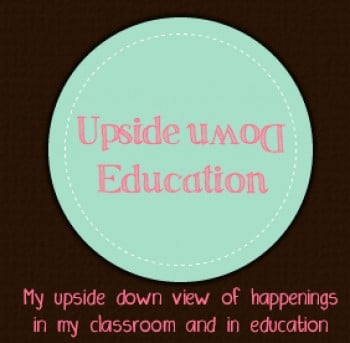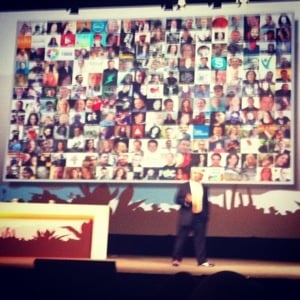
On a plane flying home from #iste13. I’m tired, my body hurts (I am reminded why I have a special made bed as well as why you should not do as Taylor Swift says and act 22, especially when you are 32), and my brain is fried. Usually when I leave a conference I have to decompress all I learned. Not this trip. No matter how bad or good a session was or how long I was in the expo all or who I was having a convo with the same thing always kept popping up in my head. The best part, the closing keynote took all of those thoughts and wrapped them in a pretty blue box and put a bow on top.
So inside this beautiful package was this: *in movie preview man voice* THE GREATEST EDUCATIONAL DISCOVERY! A TOOL THAT WILL CHANGE YOUR TEACHING! REMEMBER THIS TOOL BECAUSE IT IS ALL YOU NEED! So are you ready to know what that tool was? It is …wait for it… PEOPLE!
Yeah that is pretty simple, huh? People. The number one most important thing in education today is people. Students, teachers, admins, coaches, and even custodians. I know, it is pretty complicated tool. The learning curve can be great at times, like can be larger than the MS Surface but if you use the LOVE operating system it usually has a good tech support.
You see if our biggest focus ever becomes tools (and the way ISTE approves more tools/apps sessions than sessions that cause higher level thinking, opinion making, and problem solving on our part as attendees looks like that is where we are headed) and what’s the newest gadgets, we are going to have some major issues with our future generations. Why even have kids? Maybe we could just make kid robots that use tools. Ok so that was a little extreme and snarky. But it terrifies me to walk through the Expo hall and see adults pushing each other and screaming because they want to win a handheld fan. Like they have those on the dollar aisle at Target. It terrifies me watching teachers sit through hour long lectures listening to marketing majors tell them how their products will transform their classroom. It terrifies me when I talk to people I respect and hear their amazing presentation proposal were turned down to make room for more web 2.0 tools or apps sessions. Maybe that session on metacognition of a particular age group and how to use tech to support that is more important than being able to put a cartoon hat on a photo of a cat.
I know it is a tech conference and the majority of us geek out on this stuff but we cannot lose focus that the reasons to put technology in the hands of teachers and students is to enhanced learning and connect with (wait for it…here is that tool again) PEOPLE. When the OLPC initiative started years ago there was thing that made these stand out, not the games or apps, it was the mesh system. Those not familiar, it allowed the computers to connect to other computers, think walkie-talkie : telephone ratio comparison to mesh : internet. You are close enough to connect to computer B who is close enough to connect to C who connects to D, all can then form a mesh or a net like connection. Anyway back to point, the goal was to connect PEOPLE, more specifically children, in places without internet. Again, it’s that connecting with others that is important.
Technology is just this small medium that allows us to make those connections. I still think using twitter or whatever your choice social media to sit next to the smart kids is only going to enhance your life as well as your learning. So let’s do that as well as teach our students to do that. Meeting people face to face is still important. It is the formation of relationships, it’s the conversations, the push back and disagreements. It’s the coffee shop culture that I’ve written about that pushed Austria to be an intellectual and artistic leader prewar. Most of the strong connections I mde this week were with people I kind of knew online. Some I didn’t even know had a twitter account. But their conversations pushed me to think more than any other session. I seriously missed 4 sessions I planned to go to because I started talking to people. We spent a lot of time sitting at this high top desk that people kept mistaking for an “info” desk. We figured out how to newer almost every questions. My freakish GPS programmed in my brain came in handy. But it started so many awesome conversations!
So my point of all this, before you get excited about that new gadget, ask yourself this, does it put your students or even you first? Does it focus on humans? Does it enhance lives and/or learning or is it cool? The coolest thing about people, we are all different. We AREN’T all gamers no matter what a keynote says, but we are people who have different passions, different needs, different futures. Our job is not to entertain or get their attention or make them good test takers, our job is to be people with people. Show empathy. Show love. Listen. The key to keeping that tool PEOPLE from crashing is just listening and allowing it to operate using those different passions by meeting the needs and preparing them for their futures.


